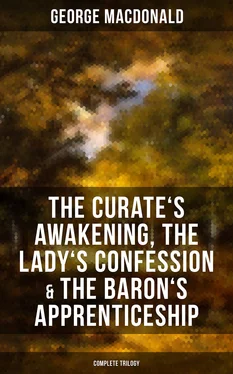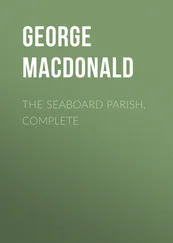During the week the hope had almost settled into conviction; and one consequence was that, although she was not a whit more inclined to introduce George Bascombe to the sick-chamber, she found herself not only equal, but no longer averse to meeting him; and on the following Saturday, when he presented himself as usual, come to spend the Sunday, she listened to her aunt, and consented to go out with him for a ride—in the evening, however, when Mrs. Rainshorn herself, who had shown Leopold great and genuine kindness, would be able to sit with him. They therefore had dinner early, and Helen went again to her brother's room, unwilling to leave him a moment until she gave up her charge to her aunt.
They had tea together, and Leopold was very quiet. It is wonderful with what success the mind will accommodate itself, in its effort after peace, to the presence of the most torturing thought. But Helen took this quietness for a sign of innocence, not knowing that the state of the feelings is neither test nor gauge of guilt. The nearer perfection a character is, the louder is the cry of conscience at the appearance of fault; and, on the other hand, the worst criminals have had the easiest minds.
Helen also was quiet, and fell into a dreamy mood, watching her brother, who every now and then turned on her a look of love and gratitude which moved her heart to its very depths. Not until she heard the horses coming round from the stable, did she rise to go and change her dress.
"I shall not be long away from you, Poldie," she said.
"Do not forget me, Helen," he returned. "If you forget me, an enemy will think of me."
His love comforted her, and yet further strengthened her faith in his innocence; and it was with a kind of half-repose, timid, wavering, and glad, upon her countenance—how different from the old, dull, wooden quiescence!—that she joined her cousin in the hall. A moment, and he had lifted her to the saddle, and was mounted by her side.
CHAPTER XXXIII.
THE RIDE.
Table of Contents
A soft west wind, issuing as from the heart of a golden vase filled with roses, met them the instant they turned out of the street, walking their horses towards the park-gate.
Something—was it in the evening, or was it in his own soul?—had prevailed to the momentary silencing of George Bascombe:—it may have been but the influence of the cigar which Helen had begged him to finish. Helen too was silent: she felt as if the low red sun, straight into which they seemed to be riding, blotted out her being in the level torrent of his usurping radiance. Neither of them spoke a word until they had passed through the gate into the park.
It was a perfect English summer evening—warm, but not sultry. As they walked their horses up the carriage way, the sun went down, and as if he had fallen like a live coal into some celestial magazine of colour and glow, straightway blazed up a slow explosion of crimson and green in a golden triumph—pure fire, the smoke and fuel gone, and the radiance alone left. And now Helen received the second lesson of her initiation into the life of nature: she became aware that the whole evening was thinking around her, and as the dusk grew deeper and the night grew closer, the world seemed to have grown dark with its thinking. Of late Helen had been driven herself to think—if not deeply, yet intensely—and so knew what it was like, and felt at home with the twilight.
They turned from the drive on to the turf. Their horses tossed up their heads, and set off, unchecked, at a good pelting gallop, across the open park. On Helen's cheek the wind blew cooling, strong, and kind. As if flowing from some fountain above, in an unseen unbanked river, down through the stiller ocean of the air, it seemed to bring to her a vague promise, almost a precognition, of peace—which, however, only set her longing after something—she knew not what—something of which she only knew that it would fill the longing the wind had brought her. The longing grew and extended—went stretching on and on into an infinite of rest. And as they still galloped, and the light-maddened colours sank into smoky peach, and yellow green, and blue gray, the something swelled and swelled in her soul, and pulled and pulled at her heart, until the tears were running down her face: for fear Bascombe should see them, she gave her horse the rein, and fled from him into the friendly dusk that seemed to grade time into eternity.
Suddenly she found herself close to a clump of trees, which overhung the deserted house. She had made a great circuit without knowing it. A pang shot to her heart, and her tears ceased to flow. The night, silent with thought, held THAT also in its bosom! She drew rein, turned, and waited for Bascombe.
"What a chase you've given me, Helen!" he cried, while yet pounding away some score of yards off.
"A wild-goose one you mean, cousin?"
"It would have been if I had thought to catch you on this ancient cocktail."
"Don't abuse the old horse, George: he has seen better days. I would gladly have mounted you more to your mind, but you know I could not—except indeed I had given you my Fanny, and taken the old horse myself. I have ridden him."
"The lady ought always to be the better mounted," returned George coolly. "For my part, I much prefer it, because then I need not be anxious about whether I am boring her or not: if I am, she can run away."
"You cannot suppose I thought you a bore to-night. A more sweetly silent gentleman none could wish for squire."
"Then it was my silence bored you.—Shall I tell you what I was thinking about?"
"If you like. I was thinking how pleasant it would be to ride on and on into eternity," said Helen.
"That feeling of continuity," returned George, "is a proof of the painlessness of departure. No one can ever know when he ceases to be, because then he is not; and that is how some men come to fancy they feel as if they were going to live for ever. But the worst of it is that they no sooner fancy it, than it seems to them a probable as well as delightful thing to go on and on and never cease. This comes of the man's having no consciousness of ceasing, and when one is comfortable, it always seems good to go on. A child is never willing to turn from the dish of which he is eating to another. It is more he wants, not another."
"That is if he likes it," said Helen.
"Everybody likes it," said George, "—more or less."
"I am not so sure of EVERYbody," replied Helen. "Do you imagine that twisted little dwarf-woman that opened the gate for us is content with her lot?"
"No, that is impossible—while she sees you and remains what she is. But I said nothing of contentment. I was but thinking of the fools who, whether content or not, yet want to live for ever, and so, very conveniently, take their longing for immortality, which they call an idea innate in the human heart, for a proof that immortality is their rightful inheritance."
"How then do you account for the existence and universality of the idea?" asked Helen, who had happened lately to come upon some arguments on the other side.
But while she spoke thus indifferently she felt in her heart like one who wakes from a delicious swim in the fairest of rivers, to find that the clothes have slipped from the bed to the floor:—that was all his river and all his swim!
"I account for its existence as I have just said; and for its universality by denying it. It is NOT universal, for I haven't it."
"At least you will not deny that men, even when miserable, shrink from dying?"
"Anything, everything is unpleasant out of its due time. I will allow, for the sake of argument, that the thought of dying is always unpleasant. But wherefore so? Because, in the very act of thinking it, the idea must always be taken from the time that suits with it—namely, its own time, when it will at length, and ought at length to come—and placed in the midst of the lively present, with which assuredly it does not suit. To life, death must be always hateful. In the rush and turmoil of effort, how distasteful even the cave of the hermit—let ever such a splendid view spread abroad before its mouth! But when it comes it will be pleasant enough, for then its time will have come also—the man will be prepared for it by decay and cessation. If one were to tell me that he had that endless longing for immortality, of which hitherto I have only heard at second hand, I would explain it to him thus:—Your life, I would say, not being yet complete, still growing, feels in itself the onward impulse of growth, and, unable to think of itself as other than complete, interprets that onward impulse as belonging to the time around it instead of the nature within it. Or rather let me say, the man feels in himself the elements of more, and not being able to grasp the notion of his own completeness, which is so far from him, transposes the feeling of growth and sets it beyond himself, translating it at the same time into an instinct of duration, a longing after what he calls eternal life. But when the man is complete, then comes decay and brings its own contentment with it—as will also death, when it arrives in its own proper season of fulness and ripeness."
Читать дальше












